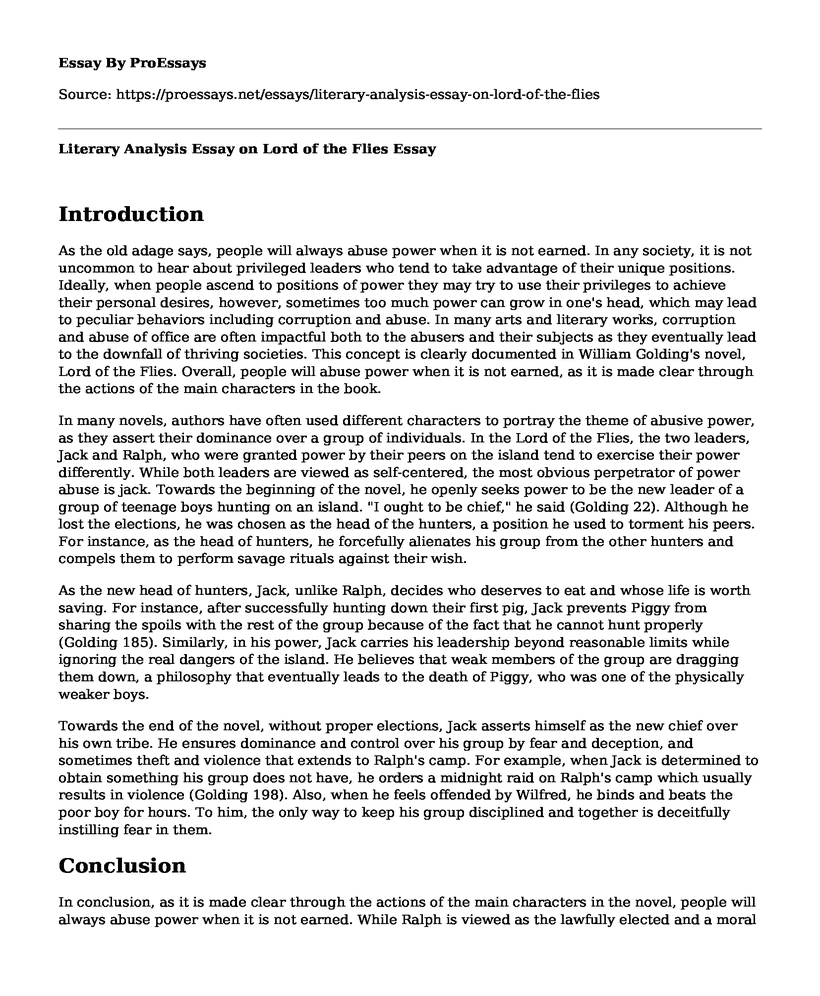Introduction
As the old adage says, people will always abuse power when it is not earned. In any society, it is not uncommon to hear about privileged leaders who tend to take advantage of their unique positions. Ideally, when people ascend to positions of power they may try to use their privileges to achieve their personal desires, however, sometimes too much power can grow in one's head, which may lead to peculiar behaviors including corruption and abuse. In many arts and literary works, corruption and abuse of office are often impactful both to the abusers and their subjects as they eventually lead to the downfall of thriving societies. This concept is clearly documented in William Golding's novel, Lord of the Flies. Overall, people will abuse power when it is not earned, as it is made clear through the actions of the main characters in the book.
In many novels, authors have often used different characters to portray the theme of abusive power, as they assert their dominance over a group of individuals. In the Lord of the Flies, the two leaders, Jack and Ralph, who were granted power by their peers on the island tend to exercise their power differently. While both leaders are viewed as self-centered, the most obvious perpetrator of power abuse is jack. Towards the beginning of the novel, he openly seeks power to be the new leader of a group of teenage boys hunting on an island. "I ought to be chief," he said (Golding 22). Although he lost the elections, he was chosen as the head of the hunters, a position he used to torment his peers. For instance, as the head of hunters, he forcefully alienates his group from the other hunters and compels them to perform savage rituals against their wish.
As the new head of hunters, Jack, unlike Ralph, decides who deserves to eat and whose life is worth saving. For instance, after successfully hunting down their first pig, Jack prevents Piggy from sharing the spoils with the rest of the group because of the fact that he cannot hunt properly (Golding 185). Similarly, in his power, Jack carries his leadership beyond reasonable limits while ignoring the real dangers of the island. He believes that weak members of the group are dragging them down, a philosophy that eventually leads to the death of Piggy, who was one of the physically weaker boys.
Towards the end of the novel, without proper elections, Jack asserts himself as the new chief over his own tribe. He ensures dominance and control over his group by fear and deception, and sometimes theft and violence that extends to Ralph's camp. For example, when Jack is determined to obtain something his group does not have, he orders a midnight raid on Ralph's camp which usually results in violence (Golding 198). Also, when he feels offended by Wilfred, he binds and beats the poor boy for hours. To him, the only way to keep his group disciplined and together is deceitfully instilling fear in them.
Conclusion
In conclusion, as it is made clear through the actions of the main characters in the novel, people will always abuse power when it is not earned. While Ralph is viewed as the lawfully elected and a moral leader, Jack, the usurper, abuses his privileges to intimidate others and to further his individual interests.
Work Cited
Golding, William. Lord of the Flies. Penguin, 1987.
Cite this page
Literary Analysis Essay on Lord of the Flies. (2023, Mar 26). Retrieved from https://proessays.net/essays/literary-analysis-essay-on-lord-of-the-flies
If you are the original author of this essay and no longer wish to have it published on the ProEssays website, please click below to request its removal:
- Finding From the Appeal to the Colored Citizens of the World Essay
- Double-Take: A Memoir by Kevin Connolly Paper Example
- The Parable of the Sower by Octavia Butler Paper Example
- The New Prometheus: Depictions of the Romantic Hero in Mary Shelley's Frankenstein
- Biographical Criticism of John Donne Essay Example
- Literary Analysis Essay on A Country Doctor
- Essay Example on Mrs. Rowlandson's Captivity and Restoration: An Archetypal Model







